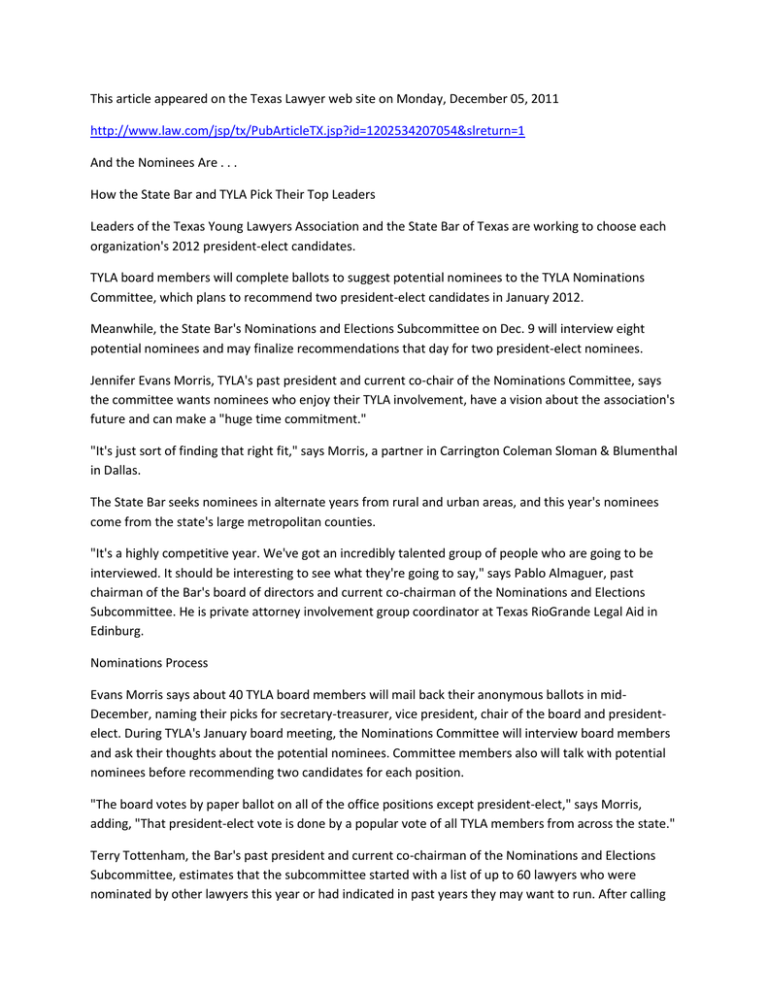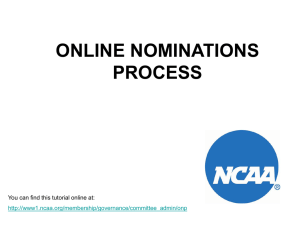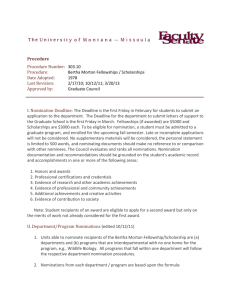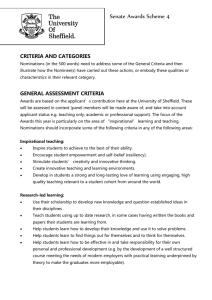This article appeared on the Texas Lawyer web site on... And the Nominees Are . . .
advertisement

This article appeared on the Texas Lawyer web site on Monday, December 05, 2011 http://www.law.com/jsp/tx/PubArticleTX.jsp?id=1202534207054&slreturn=1 And the Nominees Are . . . How the State Bar and TYLA Pick Their Top Leaders Leaders of the Texas Young Lawyers Association and the State Bar of Texas are working to choose each organization's 2012 president-elect candidates. TYLA board members will complete ballots to suggest potential nominees to the TYLA Nominations Committee, which plans to recommend two president-elect candidates in January 2012. Meanwhile, the State Bar's Nominations and Elections Subcommittee on Dec. 9 will interview eight potential nominees and may finalize recommendations that day for two president-elect nominees. Jennifer Evans Morris, TYLA's past president and current co-chair of the Nominations Committee, says the committee wants nominees who enjoy their TYLA involvement, have a vision about the association's future and can make a "huge time commitment." "It's just sort of finding that right fit," says Morris, a partner in Carrington Coleman Sloman & Blumenthal in Dallas. The State Bar seeks nominees in alternate years from rural and urban areas, and this year's nominees come from the state's large metropolitan counties. "It's a highly competitive year. We've got an incredibly talented group of people who are going to be interviewed. It should be interesting to see what they're going to say," says Pablo Almaguer, past chairman of the Bar's board of directors and current co-chairman of the Nominations and Elections Subcommittee. He is private attorney involvement group coordinator at Texas RioGrande Legal Aid in Edinburg. Nominations Process Evans Morris says about 40 TYLA board members will mail back their anonymous ballots in midDecember, naming their picks for secretary-treasurer, vice president, chair of the board and presidentelect. During TYLA's January board meeting, the Nominations Committee will interview board members and ask their thoughts about the potential nominees. Committee members also will talk with potential nominees before recommending two candidates for each position. "The board votes by paper ballot on all of the office positions except president-elect," says Morris, adding, "That president-elect vote is done by a popular vote of all TYLA members from across the state." Terry Tottenham, the Bar's past president and current co-chairman of the Nominations and Elections Subcommittee, estimates that the subcommittee started with a list of up to 60 lawyers who were nominated by other lawyers this year or had indicated in past years they may want to run. After calling everyone on the list, the subcommittee chose eight potential nominees to interview, because those people expressed an interest in running this year, indicated they could make the time commitment to serve and said they wanted to be interviewed. Tottenham, of counsel at Fulbright & Jaworski in Austin, says each interview will last 30 minutes, and he expects the subcommittee will ask questions about each potential nominee's qualifications, interest in being president-elect, vision for the Bar and priorities if elected. Immediately after the interviews, Tottenham says he hopes the subcommittee will deliberate and choose two nominees to recommend to the Bar's board of directors. The board will vote formally to choose two candidates at its January meeting. Tottenham says, in his experience, the board only considers the subcommittee's two nominees, but he doesn't know of any official rule that would prevent a director from proposing the board consider someone else. Change the Process? Steve Fischer, a member of the State Bar board of directors, says he'd like to see changes in how the State Barsubcommittee chooses president-elect nominees. "Behind closed doors, using our Bar dues, they pick two candidates," Fischer says about the subcommittee. Fischer, a Rockport solo, thinks the subcommittee should use a "point system" to choose nominees based on factors like articles they've published and service on Bar committees. The Bar's election rules say lawyers who want to run for president-elect without the subcommittee's recommendation can get on the ballot if they submit a written petition with signatures from 5 percent of active Bar members. Fischer says it's too challenging to collect so many signatures, and he recommends lowering the requirement from 5 percent to 1 percent of active Bar members. He also says he thinks it's unfair the Bar reimburses travel expenses for the subcommittee's nominees to travel to their subcommittee interviews, but outside candidates must cover their own expenses when gathering signatures. Tottenham says he's open to suggestions about changing the nominations process, but he says the subcommittee does not run a "closed shop" when seeking nominees. Tottenham says he is an example: He only served on the Bar's board of directors for one year in the mid-1980s before he was chosen as a president-elect candidate in 2009. "We have a very open process, and we get the word out as much as we know how, to any and everyone who would like to run. I'm just delighted to have as many who indicated an interest this year," says Tottenham. The following potential nominees for State Bar president-elect have been invited to interview with the Bar's Nominations and Elections Subcommittee. They are listed alphabetically below, and information includes job title, firm or employer, city, law school from which each graduated and graduation year. Under Consideration Steve Bolden Shareholder in Mahomes Bolden, Dallas Texas Southern University Thurgood Marshall School of Law in Houston, 2000 Janna Ward Clarke Of counsel at Broude, Smith & Jennings, Fort Worth Texas Tech University School of Law in Lubbock, 1984 Beryl "Berry" Crowley Solo and principal in Crowley Legal Recruiting, Austin The University of Texas School of Law in Austin, 1971 David Crump Law professor at The University of Houston Law Center, Houston The University of Texas School of Law in Austin, 1969 Jarvis Hollingsworth Partner in Bracewell & Giuliani, Houston The University of Houston Law Center in Houston, 1993 Judy Ney Hearing officer for the Texas Workers' Compensation Commission, Houston South Texas College of Law in Houston, 1982 Paula Sweeney Of counsel at Slack & Davis, Dallas Southern Methodist University School of Law in Dallas, 1981 Lisa Tatum Solo, San Antonio Santa Clara University School of Law in Santa Clara, California, 1994 — ANGELA MORRIS



